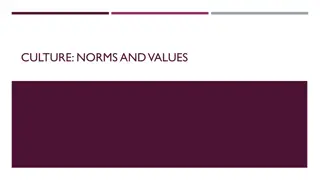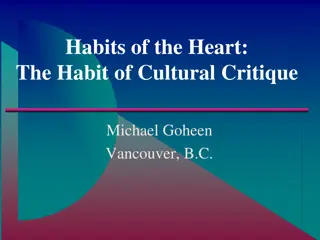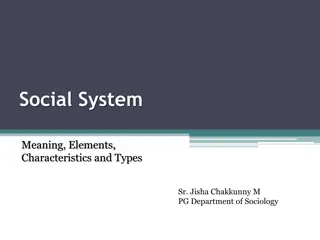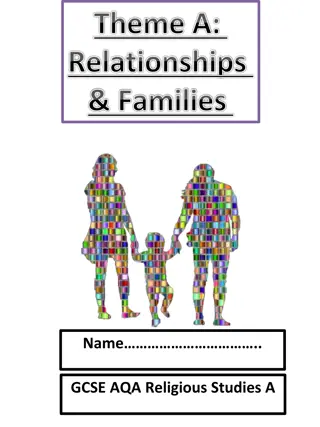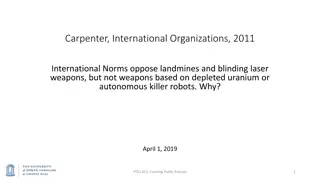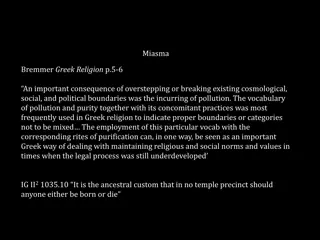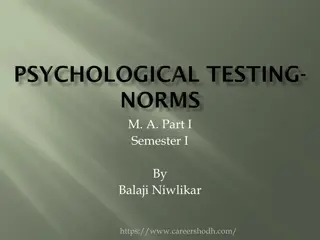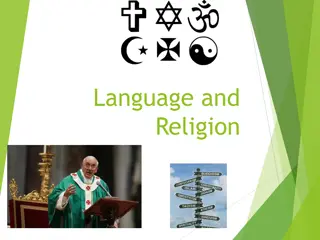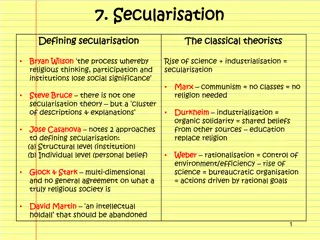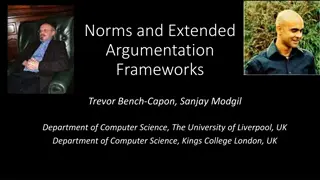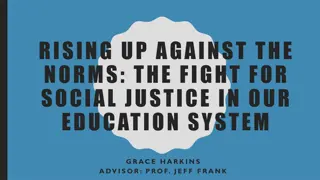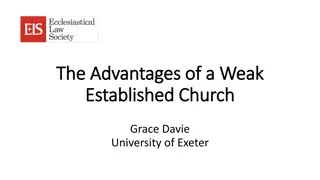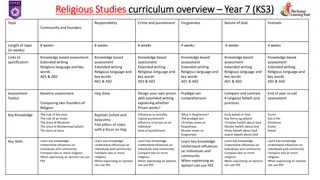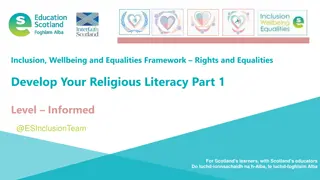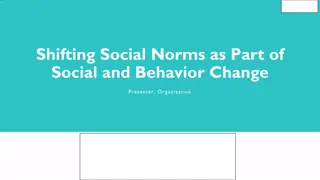Status of Family Laws in India: Hindu vs. Religious Minorities
The family and personal status laws in India vary between Hindu law and those pertaining to religious minorities. While Hindu law has seen extensive reforms, discriminatory provisions still exist. In contrast, laws governing religious minorities have undergone fewer reforms, leading to greater inequ
2 views • 4 slides
Understanding Normed Vector Spaces for Nanotechnology Engineering
Introduction to normed vector spaces, focusing on defining norms for vectors in finite-dimensional spaces, exploring different ways to measure vector length, and understanding the concept of unit vectors and norm properties. This topic equips readers with the ability to calculate vector norms, norma
0 views • 9 slides
Understanding Religious Conflict: Definition and Types Explored
Religious conflict is a complex and recurring concept throughout history. Scholars have defined it as disagreements between religious groups. This conflict arises from contentious issues touching on ideology, morality, power, and identity, influenced by various socio-political, economic, and cultura
1 views • 13 slides
Evolution of Akbar's Religious Policy: A Historical Overview
In the 16th century, Akbar the Great implemented a revolutionary religious policy in the Mughal Empire. Initially a devout Sunni Muslim, Akbar evolved his stance to promote harmony and equality among all religions, fostering tolerance and understanding. This shift marked a significant departure from
0 views • 25 slides
Understanding Cultural Norms and Values
Sociologists define culture through norms, values, beliefs, and material objects. Norms are rules that govern behavior, with three basic types: folkways, mores, and laws. Folkways are customs without moral significance, mores are norms with moral importance, and laws are clearly defined and enforced
0 views • 15 slides
Understanding the Heart: Cultural Reflections and Religious Insights
Exploring the concept of "habits of the heart" through historical, philosophical, and religious lenses, this content delves into how human behavior is shaped by ingrained customs rooted in the core of one's being, the heart. From cultural critique to religious reflections, the narrative highlights t
0 views • 46 slides
Elizabethan Religious Settlement: Unity Amidst Division
Amid religious division in England, Queen Elizabeth I implemented a Religious Settlement in 1559 to unify the country. The settlement, a blend of Protestant and Catholic elements, aimed to maintain peace and prevent rebellions. Elizabeth's strategic compromise pleased most people, though lingering t
0 views • 14 slides
Understanding Secularism: Principles and Advantages
Secularism is the principle of separating government institutions from religious entities to ensure equal rights for believers and non-believers. It safeguards freedom of religious belief and practice, upholds religious freedom, and promotes democracy and fairness. Secularism aims to prevent religio
0 views • 21 slides
Understanding Social Systems: Meaning, Elements, Characteristics, and Types
Social systems are orderly arrangements of social interactions based on shared norms and values. Talcott Parsons introduced the concept in modern sociology, defining it as an interrelationship of social actors interacting based on shared cultural norms. Social systems encompass various subsystems li
2 views • 70 slides
Relationships and Families in Religious Studies: Key Terms and Concepts
Explore key terms related to relationships and families in GCSE AQA Religious Studies, including definitions of nuclear family, human sexuality, stepfamily, extended family, and various social and legal aspects of family dynamics and structures. Delve into topics such as marriage, gender equality, c
0 views • 23 slides
International Norms and Weapons Regulation: Analyzing the Selectivity of Bans
International norms exhibit selectivity in banning certain weapons like landmines and blinding laser weapons while permitting others such as depleted uranium-based arms and autonomous killer robots. The discrepancy raises questions about ethical outrage in weapon condemnation and the role of agenda-
0 views • 12 slides
Understanding Religious Language: Cognitivism vs. Non-Cognitivism in the University Debate
This discussion explores the debate between cognitivism and non-cognitivism in religious language. Cognitivism asserts that religious claims aim to describe the world and can be true or false, while non-cognitivism argues that such claims express attitudes and cannot be verified. Flew's challenge qu
0 views • 9 slides
AP World History Interactions in Early Urban Societies
Interactions in early urban societies, as depicted in inscriptions, provide insights into the development of trade networks, social hierarchies, and religious influences. Questions explore the context of inscriptions, social norms, and religious practices during specific historical periods.
0 views • 8 slides
Understanding Pollution and Purification in Greek Religion
The concept of pollution and purification played a crucial role in maintaining religious and social norms in ancient Greek society. Breaking boundaries or defying societal expectations could lead to pollution, necessitating purification rituals. Examples of actions that could cause pollution include
0 views • 7 slides
Understanding Measures of Central Tendencies and Norms in Test Evaluation
Exploring topics such as measures of central tendencies (mean, median, mode), variability, understanding raw scores, standardization samples, norms in test evaluation, and types of evaluation protocols. Learn about developing norms, derived score interpretation, and the significance of evaluation me
7 views • 35 slides
Guide to Using the BSA Calendar of Religious Observances
The BSA Calendar of Religious Observances is a valuable resource for scheduling scouting events in consideration of various religious holidays and observances. This guide provides an overview of the calendar, highlights important dates, and emphasizes the importance of respecting religious diversity
0 views • 8 slides
Understanding Jesus' Rejection in the Gospel of Mark
Explore the reasons behind the rejection of Jesus by the Pharisees in the Gospel of Mark, including his conduct, challenges, and claims. Discover how his actions conflicted with religious norms of fasting and Sabbath observance, leading to opposition from religious leaders. Jesus' role as the Brideg
1 views • 11 slides
Understanding the Role of Language in Religion
Exploring the significance of language in religious contexts, this content discusses the functions, features, lexicon, grammar, and metaphorical aspects present in religious language. It delves into how religious language upholds spiritual beliefs, persuades believers, and expresses specific attitud
0 views • 8 slides
Understanding the Cultural Dimensions of Food and Religious Influences in Culinary Arts
Explore the impact of religious beliefs on food traditions and dietary restrictions across different cultures in the culinary world. Learn about the influence of major world religions on eating habits, food choices, and culinary practices. Discover how various religious groups, such as Christians, o
0 views • 26 slides
Advanced Techniques in Online and Bandit Algorithms Beyond Norms
Delve into the realm of online and bandit algorithms beyond traditional norms as discussed by Sahil Singla from Georgia Tech in collaboration with Thomas Kesselheim and Marco Molinaro. The presentation explores the design and optimization of algorithms for online settings, shedding light on load bal
0 views • 21 slides
The Vital Role of Religious Institutions in Supporting Immigrants
Religions and immigration are interlinked in modern societies, where religions play a significant role in providing services, defending rights, and supporting the social cohesion of immigrants. Mainstream religious institutions serve as key actors in offering assistance, advocating for migrant right
2 views • 14 slides
Understanding Religious Language: Flew, Hare, Mitchell
Exploring the contrasting views of cognitivism and non-cognitivism in the context of religious language through the perspectives of Flew, Hare, and Mitchell. Delve into Flew's challenge on the undetectable gardener, Hare's concept of bliks, and Mitchell's response to the rationality of religious bel
0 views • 7 slides
Religious Accommodation in the Army: Advising Command
The content discusses the role of the Chaplain Corps in advising Soldiers and leaders on religious accommodation in the Army as of February 13, 2019. It covers learning objectives, legal foundations, Army policies, procedures, recent changes, and references related to religious accommodation. The in
0 views • 36 slides
Understanding Religious Discrimination Laws in California Workplace
Learn about the regulations and protections under FEHA and Title VII in California, including religious exemptions, accommodation requirements, case studies, and best practices to address discrimination issues effectively. Discover the statistical insights on religious discrimination complaints and
0 views • 45 slides
Understanding Group Dynamics in Team Environments
Group norms play a crucial role in shaping behavior within a team setting, whether through prescribed norms taught to new members or emergent norms that develop through group interactions. Group roles like initiator, facilitator, and agitator also impact how a team functions. Effective initiators co
0 views • 27 slides
Understanding Secularisation: The Decline of Religious Influence in Society
Secularisation refers to the process in which religious thinking, participation, and institutions lose their social significance. This phenomenon is influenced by factors such as the rise of science, industrialisation, changing social attitudes, and the disengagement of the church from society. Evid
0 views • 8 slides
Philosophers' Views on Religious Experience: Insights and Critiques
This lesson delves into the perspectives of various philosophers such as Rudolph Otto, Richard Swinburne, John Hick, and Michael Persinger on religious experiences. It explores concepts like the numinous, religious knowledge, God's existence, and criticisms on the validity of religious experiences.
0 views • 7 slides
Philosophers' Views on Religious Experience: Insights from William James
Explore William James' perspective on religious experiences, including his views on existential and value judgments. Understand how James argued for the validity of religious experiences and their potential proof of God's existence. Delve into the implications of emotions and prior beliefs on interp
0 views • 7 slides
Overview of Sixteenth Century English Poetry and the Renaissance
The introduction provides insights into sixteenth-century English poetry, the Renaissance era, and the defining characteristics of the period. It delves into the intellectual, religious, political, and social contexts of the time, highlighting key figures and movements like the Reformation, the Grea
1 views • 12 slides
Religious and Social Conflicts Fueling the Rise of Absolutism in Europe
Social, economic, and religious conflicts in Europe played a significant role in the emergence of absolutism where monarchs wielded supreme power without sharing it with legislative bodies. Events like Spain's religious conflicts, Protestantism in England, the Spanish Armada, religious conflict in t
0 views • 10 slides
Religious Pluralism and Civil Society: A Paradox in Government Control
Understanding the intricacies of religious pluralism in the context of government control reveals a paradox where restricting religion can hinder social cohesion and economic growth. Through insights on the counterproductivity of control, the role of religious organizations in civil society, and the
0 views • 16 slides
US Religious Freedom Restoration Act (RFRA) Overview
The US Religious Freedom Restoration Act (RFRA) aims to protect the free exercise of religion by ensuring that governments do not substantially burden religious practices without compelling justification. It emphasizes striking a balance between religious liberty and governmental interests through t
0 views • 9 slides
Norms and Practical Reasoning Frameworks in Value-Based Argumentation
Norms play a crucial role in influencing behavior through practical reasoning. Practical reasoning involves using value-based argumentation frameworks to generate and evaluate arguments, as demonstrated in the parable of the Ant and the Grasshopper. The story highlights the importance of planning fo
0 views • 15 slides
Challenging Education Norms: Towards Social Justice
The fight for social justice in the education system is imperative as flawed norms hinder progress. Recognizing gender norms in teaching, addressing racial inequalities, and navigating COVID-19 disruptions are key areas of focus. By breaking down entrenched norms, empowering students, and advocating
0 views • 31 slides
Reflections on Religion in Europe: Long-term Perspectives and Contemporary Challenges
Several decades of research on religion in Europe have revealed a distinctive pattern that highlights both the presence and absence of religious influences. The context of cultural institutions, historic churches, shifting societal norms, and increasing diversity poses both opportunities and challen
0 views • 26 slides
Religious Studies Curriculum Overview for Year 7 and 8 (KS3)
Explore various topics such as responsibility, crime and punishment, forgiveness, nature of God, festivals, community, founders, worship, creation, life after death, rules and laws, relationships in this detailed Year 7 and 8 (KS3) Religious Studies curriculum. The curriculum includes assessments, e
0 views • 6 slides
Understanding Norms and Global Governance Dynamics
Explore the complex interplay between norms, governance structures, and international tribunals in the context of global perspectives and societal behavior. Discover how norms evolve, the roles of various stakeholders, and the impact on accountability and justice in a changing world landscape.
0 views • 22 slides
Developing Religious Literacy for Educators in Scotland
This resource aims to enhance educators' understanding of religious literacy by exploring religious discrimination, core beliefs of major faiths, and additional learning sources. It encourages educators to consider the needs of learners in relation to their religious beliefs in Scotland.
0 views • 30 slides
Advancing Social Norms in SBC Programming
Explore the nuances of social norms programming and its impact on behavior change initiatives. Delve into the strategies and evolution of shifting social norms for effective outcomes.
0 views • 56 slides
Settling the Northern Colonies: Religious Transformation and Colonization
The Protestant Reformation led to the emergence of Puritanism in the Northern Colonies, with figures like Martin Luther and John Calvin shaping religious beliefs. The Massachusetts Bay Colony stood as a beacon of self-government and religious ideals, while dissenters like Anne Hutchinson and Roger W
0 views • 9 slides




